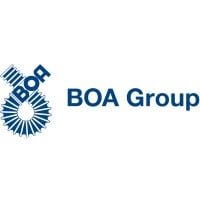
BOA Group
The BOA GROUP is one of the world’s leading manufacturers for flexible mechanical elements for the automotive and aerospace industry as well as for a wide range of industrial applications. We have 150 years of experience in solving the challenges in gas and fluid transportation for our customers. The headquarters is based in Stutensee near Karlsruhe / Germany. With over 800 employees, the BOA GROUP develops, produces and distributes flexible stainless steel components for engine management, exhaust systems, fuel systems and side components for passenger cars and heavy vehicles. In the industrial division, the BOA GROUP delivers flexible elements for applications in the Energy sector, Shipping, Rail and Heavy Engine industry. BOA flexible elements include both standard and custom products. Individual solutions are developed in partnership with our customers. Please find out more about BOA's products and services: www.boagroup.com






